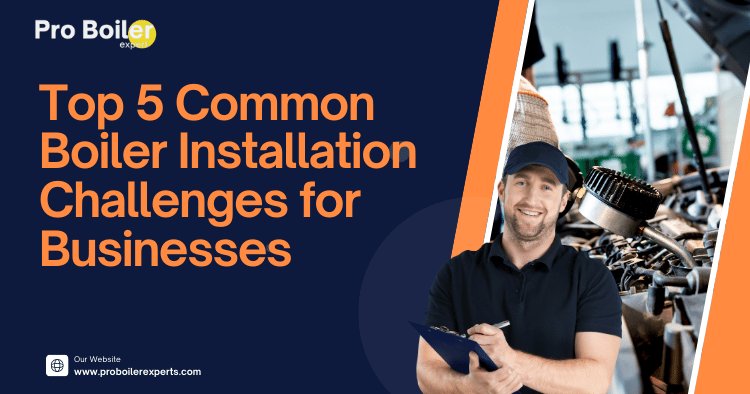- Understanding Boiler Types
- Compliance with Regulations
- Site Preparation and Space Constraints
- Integration with Existing Systems
- Budgeting and Cost Management
Installing a new boiler is a significant investment for any business, but it can also come with its fair share of challenges. Understanding these common hurdles can help you prepare better, avoid costly mistakes, and ensure a smooth installation process. In this article, we’ll explore the top five challenges you may face during boiler installation and provide tips to navigate them successfully.
1. Understanding Boiler Types
Choosing the right boiler is crucial for your business’s heating needs. With various types available—combi, system, and conventional boilers—understanding their differences can be daunting.
Key Considerations:
- Heating Requirements: Assess your business’s specific heating needs. For instance, a combi boiler is ideal for smaller spaces, while larger facilities may require a system or conventional boiler.
- Fuel Source: Different boilers operate on various fuels, including gas, oil, and electricity. Consider the availability and cost of these energy sources in your area. For more on fuel options, check out Gas vs. Oil Boilers: 5 Key Differences.
- Efficiency Ratings: Look for boilers with high Energy Efficiency Ratings (EER) to minimize energy costs. The Energy Saving Trust provides valuable insights into efficient heating solutions.
“Choosing the right boiler isn’t just about immediate needs; it’s about future savings and efficiency.”
FAQ:
- What type of boiler is best for a commercial setting?
- The best boiler depends on your business’s size and heating demand. Consult with a heating expert to evaluate your needs.
2. Compliance with Regulations
Navigating local and national regulations can be overwhelming. Compliance is essential not only for legal reasons but also for safety and efficiency.
Important Regulations:
- Building Codes: Familiarize yourself with local building codes that dictate boiler installation standards.
- Safety Standards: Ensure compliance with safety regulations, including those set forth by the Health and Safety Executive (HSE).
- Environmental Regulations: Be aware of any emission standards that your boiler must meet to minimize environmental impact. Consider eco-friendly options such as biomass boilers or solar thermal boilers.
“Staying informed about regulations can save you from costly penalties and ensure a safe working environment.”
FAQ:
- What are the consequences of not complying with regulations?
- Non-compliance can result in fines, legal issues, and increased safety risks for your employees and customers.
3. Site Preparation and Space Constraints
Preparing the installation site is a critical step that can often be overlooked. Limited space or unsuitable conditions can lead to complications during installation.
Factors to Consider:
- Space Requirements: Ensure there is enough space for the boiler, including clearance for maintenance and ventilation.
- Accessibility: The installation area should be easily accessible for delivery and installation teams.
- Ventilation Needs: Proper ventilation is essential for safe operation. Check that your site meets ventilation guidelines.
Visual Aid: Space Requirements Table
| Boiler Type | Minimum Space Required | Ventilation Needs |
|---|---|---|
| Combi Boiler | 1 meter around unit | Direct ventilation required |
| System Boiler | 1 meter around unit | Indirect ventilation acceptable |
| Conventional Boiler | 1.5 meters around unit | Direct ventilation required |
“Proper site preparation is the backbone of a successful boiler installation. Don’t overlook it!”
FAQ:
- How do I prepare my site for a boiler installation?
- Clear the area of any obstructions, ensure adequate space, and check for proper ventilation.
4. Integration with Existing Systems
If your business has pre-existing heating systems, integrating a new boiler can pose challenges. Compatibility issues can lead to inefficiencies and increased costs.
Integration Considerations:
- Compatibility: Ensure that the new boiler is compatible with existing piping and heating systems.
- Control Systems: Evaluate whether the new boiler will work with your current control systems for optimal efficiency.
- Retrofitting: In some cases, retrofitting existing systems can improve overall performance, but it may add to the installation time and costs.
“Integration is key. A well-coordinated system can enhance efficiency and reduce operational costs.”
FAQ:
- Can I install a new boiler without replacing the entire system?
- Yes, but it’s essential to consult with a professional to assess compatibility and efficiency.
5. Budgeting and Cost Management
Finally, managing costs is a significant challenge for many businesses when installing a new boiler. From purchasing to installation and maintenance, expenses can add up quickly.
Cost Factors:
- Initial Purchase Cost: The price of the boiler varies significantly based on type, brand, and efficiency ratings. Explore options like high-efficiency boilers for better long-term savings.
- Installation Costs: Labor costs can vary depending on the complexity of the installation and local rates.
- Ongoing Maintenance: Regular maintenance is crucial for efficiency and longevity. Budget for annual inspections and potential repairs.
“Budget wisely. A little planning goes a long way in avoiding unexpected expenses.”
Budgeting Tips:
- Get Multiple Quotes: Always obtain quotes from several contractors to ensure you’re getting a fair price.
- Consider Financing Options: Some suppliers offer financing plans that can ease the burden of upfront costs. Visit top financing options for boiler installation for more information.
- Invest in Quality: While it may be tempting to cut costs, investing in a high-quality boiler can save you money in the long run through lower energy bills and fewer repairs.
FAQ:
- How much should I budget for a new boiler installation?
- On average, businesses can expect to spend between $3,000 and $10,000 for a complete boiler installation, depending on various factors.
In conclusion, understanding these common challenges can help your business navigate the boiler installation process more smoothly. By taking the time to research, prepare, and consult with professionals, you can ensure your new boiler meets your business’s heating needs effectively and efficiently. For more detailed information on boiler systems, check out the Department of Energy for resources and guidelines.
“Remember, a well-planned installation not only saves you time and money but also provides comfortable and reliable heating for your business for years to come.”




